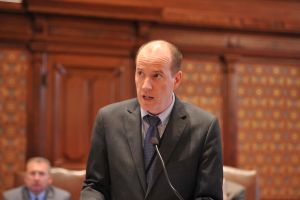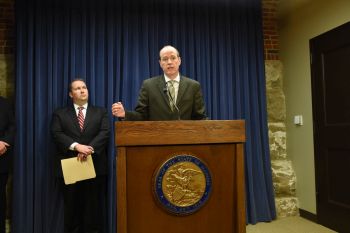- Details
- Category: Press Releases
 SPRINGFIELD—Local law enforcement will work to keep guns out of the hands of people who have orders of protection against them thanks to a new Illinois law.
SPRINGFIELD—Local law enforcement will work to keep guns out of the hands of people who have orders of protection against them thanks to a new Illinois law.
House Bill 6331, sponsored by Senator Bill Cunningham, will require the state police to notify local police agencies to assist in seizing a Firearm Owners Identification Card when that person’s card has been revoked by a judge in an order of protection case.
“If law enforcement is going to successfully protect victims of domestic violence, all police agencies must have the information they need to enforce court orders," Cunningham said. "As the law stands today, the state police must shoulder the entire burden on their own. That's not fair to the state police or to the victims of domestic violence."
- Details
- Category: Press Releases
 SPRINGFIELD—Senator Bill Cunningham during the spring legislative session pushed to expand and extend the successful accelerated resolution court, also known as Rocket Docket, in Cook County.
SPRINGFIELD—Senator Bill Cunningham during the spring legislative session pushed to expand and extend the successful accelerated resolution court, also known as Rocket Docket, in Cook County.
The legislation, signed into law today, would add minor traffic and drug offenses to the program and extends the program’s sunset date to 2019. The Rocket Docket program expedites the adjudication of minor offenses by requiring they be tried with 30 days.
“This program has been a success since day one in controlling overcrowding of Cook County Jail,” Cunningham said. “It also has been a success in lowering the financial burden on taxpayers who fund the jail.”
Currently, the Cook County Sheriff refers defendants to the program and the Cook County State’s Attorney approves those referrals. For any defendant to be eligible they are not allowed to have any prior convictions for violent offenses within the past 10 years and must be unable to post bond.
“It only made sense to keep a successful program running,” Cunningham said.
Senator Cunningham represents portions of Worth, Orland and Palos Townships in the southwest suburbs and the neighborhoods of Mt. Greenwood, Beverly, Morgan Park and Auburn-Gresham in Chicago.
- Details
- Category: Press Releases
 CHICAGO – Drivers who travel near Marist High School will enjoy a faster commute and less congestion because of a road widening project backed by Senator Bill Cunningham and Representative Fran Hurley.
CHICAGO – Drivers who travel near Marist High School will enjoy a faster commute and less congestion because of a road widening project backed by Senator Bill Cunningham and Representative Fran Hurley.
“For years the residents of our community have been dealing with the extreme congestion that occurs at the intersection near Marist,” Cunningham said. “We needed a solution.”
The local project includes adding a turn lane to smooth out traffic at 115th Street and Pulaski Road. Cunningham and Hurley pushed the Illinois Department of Transportation to prioritize widening the intersection.
“Projects like these continue to be critical drivers in our economy,” Cunningham said. “We can’t let road projects lapse. It harms our communities and allows our infrastructure to degrade.”
“This intersection has been a traffic-clogging nuisance to motorist in our community for decades,” Hurley said. "Not only will widening the intersection make for quicker commutes, it also will make the intersection safer for both motorists and pedestrians."
The project is part of the nearly $63 million dollars planned to be invested in roadwork throughout the 18th Illinois Senate district over the next six years.
Prior to the stopgap spending plan passed by the General Assembly on June 30, the director of IDOT announced that all projects would be stopped on July 1 due to the lack of a budget. But Senator Cunningham and Representative Hurley pushed for a stopgap measure that would keep projects on schedule.
From Left to Right: Edward Moody, Worth Township Highway Commissioner, Senator Bill Cunningham, 18th Senate District, Patrick Kitching, Mayor of Alsip, Representative Fran Hurley, 35th House District, Kevin Hughes, Supervisor of Worth Township, Brother Hank Hammer, President of Marist High School,
Larry Tucker, Principal of Marist High School
- Details
- Category: Press Releases
 SPRINGFIELD—New safeguards for processing DNA evidence will be put in place to improve tracking of sexual assault offenders thanks to legislation, sponsored by Senator Bill Cunningham, being signed into law.
SPRINGFIELD—New safeguards for processing DNA evidence will be put in place to improve tracking of sexual assault offenders thanks to legislation, sponsored by Senator Bill Cunningham, being signed into law.
On Friday, the governor signed Senate Bill 2221, which would require the state police notify not only the local police department when a potential DNA match has been found, but they must also report the finding to the appropriate state’s attorney.
The new law comes in response to a situation that occurred in the Village of Robbins, when the local police department failed to follow through on a rape investigation after a state crime lab alerted them of a positive match on a DNA test kit. The suspect identified by the lab was never arrested and went on to commit additional crimes.
“This new law will enable prosecutors to follow up on lab reports and ensure that positive DNA matches are being investigated by local police departments," Cunningham said. "Victims of sexual assault must have confidence that law enforcement is doing everything possible to track down violent sexual predators."
The new law would also require that local police departments and the state police take annual inventories of DNA test kits in their possession and report that to the appropriate state’s attorney’s office.
The new law went into effect immediately. Cunningham thanked Cook County Sheriff Tom Dart for bringing the issue to light and for his department's work reinvestigating dozens of unsolved rape cases in Robbins.
More Articles …
Page 53 of 71



